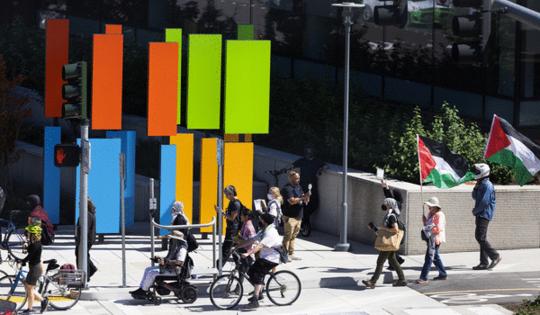Protesters breach Microsoft president's office, decrying ties to Israel
Published in Business News
REDMOND, Wasington — Activists protesting Microsoft’s work for the Israeli government breached one of the tech giant’s buildings at its headquarters Tuesday afternoon as part of ongoing demonstrations.
The security breach was first publicized at 1 p.m. by No Azure for Apartheid, a group of Microsoft workers and others opposed to the use of the company’s technology by the Israeli state and military.
The group said protesters sat and chanted in Microsoft President Brad Smith’s office in Building 34, where they also hung banners. According to No Azure for Apartheid, one sign dubbed the building as “Mai Ubeid Building” — its namesake being the late Mai Ubeid, a software engineer in Gaza who was killed in 2023 by an Israeli airstrike — and another pressed Microsoft to “cut ties with Israel,” among other demands.
Abdo Mohamed, No Azure for Apartheid organizer and former Microsoft worker, said seven arrests took place inside the building, a number confirmed by Redmond police.
“Microsoft continues to militarize its campus, to harass, brutally attack and violently arrest its workers and community members,” Mohamed said in a Tuesday phone interview.
Those taken into custody were arrested on suspicion of trespassing, resisting arrest and obstruction, Redmond Police Department spokeswoman Jill Green said.
Smith held a news conference in his office hours after its occupation. He noted that it had to be cleaned for the media event.
Of those arrested on Tuesday, Smith identified two as Microsoft employees, adding that their behavior doesn’t constitute “standard employee conduct” and will be reviewed.
He said activists planted crude listening devices, such as cellphones hidden under couches and behind books, in the building during the occupation.
Smith said an employee reported on Monday that an activist from No Azure for Apartheid was calling workers to ask for a building floor plan. Microsoft will adapt its security accordingly, he added.
“We need to keep our workplace safe and secure,” Smith told reporters. “We respect the freedom of expression that everyone in this country enjoys — as long as they do it lawfully.”
Redmond police responded to reports of demonstrators on a Microsoft campus sidewalk around 1 p.m. Officers tried to move the seven people who had barricaded themselves inside an executive office. They refused to comply and were arrested, Green said. The demonstrators outside the building moved to a public area and dispersed.
A uniformed member of Microsoft Global Security told a Seattle Times reporter that Building 34 was under lockdown around 2:45 p.m., and entry was prohibited.
Law enforcement officers patrolled the area surrounding Building 34, blocking entrances and exits from traffic. Police set up a command post in a nearby building, and a pair of Redmond Police Department officers mentioned that they were working overtime to respond to the incident.
“Workers were back today, community members were back today, saying it very clearly that we will not stop, we will not rest,” Mohamed said. “This violence, this retaliation, this harassment will not deter us from calling out Microsoft, from holding those executives accountable.”
Smith said the company will not retaliate against employees who appropriately share their views by messaging through internal communications services, sending petitions and protesting in public spaces.
“But if people engage in vandalism, if they violate repeatedly our email policies, if they storm buildings, if they occupy offices, if they create threats to others, that’s different,” he said. Violations of email policies include employees sending mass emails detailing their political views.
Tuesday’s incident is an escalation from protests that began on Aug. 19 — the day that Microsoft kicked off an independent investigation into how its Azure cloud technology is being used by the Israel Defense Forces.
Smith depicted the majority of Microsoft’s work for the Israeli military as protecting the country’s cybersecurity.
“Microsoft is not a government; it’s not a country. It’s a company,” Smith said. “We will do what we can and what we should — and that starts with ensuring that our human rights principles and contractual terms of service are upheld everywhere by all of our customers around the world.”
Microsoft has thousands of trusted employees in Israel and across the Middle East, he continued, and his team is hearing “no small measure of feedback” from the Jewish, Palestinian and Middle Eastern contingents.
Last week, dozens of activists occupied part of a plaza on Microsoft’s campus during demonstrations over two days. Twenty protesters were arrested on suspicion of various charges on the second day, after Redmond police ordered the group to leave. Of the 20 people arrested, one was a current Microsoft employee, and three were former employees “previously terminated for similar conduct,” a Microsoft spokesperson said.
The same group protested Thursday at the Redmond Technology Station near Microsoft’s headquarters.
“To my colleagues, we are not helpless,” Microsoft worker Nisreen Jaradat said at Thursday’s protest. “We are the ones building Microsoft technology. We are the ones keeping Microsoft running. Our labor is power, our voice is power and our collective action is power. We have the choice to reject being a party to genocide.”
©2025 The Seattle Times. Visit seattletimes.com. Distributed by Tribune Content Agency, LLC.












Comments